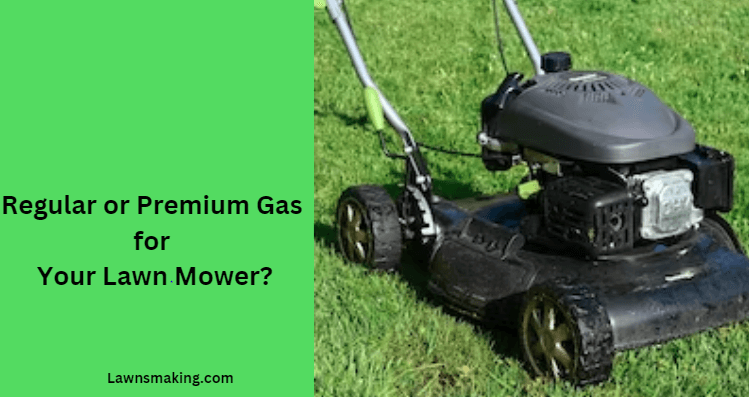
The type of fuel you use in your lawn mower determines how well the machine works on the lawn. Besides, high-quality gas can increase the mower’s lifespan. With that in mind, should you use regular or premium gas in your lawn mower?
You should use regular gas in your lawn mower, especially if it has a small, single-cylinder engine. Regular gas runs the engine efficiently and effectively. Using premium gas may sound like a genius idea initially, but it’s a waste of money and uneconomical in the long run.
If you are wondering which is the best fuel for your lawn mower, keep reading this article as I take you through everything. Let’s jump in right off the bat.
What Kind of Gas Is Best for a Lawn Mower?
The kind of gas best for a lawn mower should be clean, fresh, and unleaded. The gas should also have a minimum of 87 or higher octane rating. As for its ethanol or gasohol content, 10 percent is acceptable.
The 10 percent is called E10, the most common and widely available gas for small engines. You can also consider using ethanol-free gasoline to avoid your machine’s engine attracting moisture and experiencing all sorts of problems.
Even so, ethanol-free gas is expensive. Hence, this gas is less commonplace than other ordinary fuel types.
Remember to check your lawn mower’s manual for specific fuel recommendations. Different manufacturers recommend different fuel types depending on the engine type and model of the lawn mower.
That said, the correct fuel type determines whether your lawn mower runs smoothly and efficiently or not. So, ensure the fuel is approved for increased performance, better consumption, and reduced emissions.
Even with the best fuel, proper storage is key. Otherwise, poorly-stored gas can still lead to poor engine performance. To that effect, using fuel stabilizers to extend the lifespan and efficiency of gas is vital for increased engine performance in the long term.
The table below summarizes the differences between regular and premium gas for lawnmowers:
| Feature | Regular Gasoline | Premium Gasoline |
| Octane level | Between 85 and 87 | Between 90 and 95 |
| Combustion quality | May lead to more engine knocking | Reduced likelihood of engine knocking |
| Engine performance | Adequate for most small engines | Potential for improved performance |
| Price | Lower | Higher |
| Fuel additives | Fewer additives | Enhanced with additional detergents and cleaners |
| Engine longevity | May result in more carbon deposits | Reduced carbon buildup, potentially extending engine life |
| Recommended use | Suitable for standard lawn mower engines | Recommended for high-performance engines or when specified by the manufacturer |
Find Out: How Much Torque Does a Lawn Mower Have?
Tips to Use Gas In Your Lawn Mower Effectively
The following are key things to consider when using gas in a lawn mower;
- Always consider the recommendations from the manufacturer regarding the lawn mower’s fuel usage. Usually, the manual provides guidance and specific instructions on the gasoline type to use, fuel octane rating, and more.
- Remember to purchase approved gasoline from a reputable station. Such stations boast high turn-over purchases, giving you the best chance of getting high-quality fresh fuel.
- Store your gas in proper fuel storage containers and keep them in a cool, dry place. Make sure the containers are away from direct sunlight.
- You can drain your lawn mower’s tank if you store it for an extended period. Otherwise, you should use fuel stabilizers to ensure the gas doesn’t deteriorate.
Is Premium Gas Better for Lawn Mowers?
Premium gas is not better for lawnmowers because it doesn’t improve fuel efficiency or motor performance more than regular gas despite having a higher octane grade. In fact, its price is extremely high, making it expensive and unavailable for most homeowners.
Back to fuel efficiency, lawn mower engines are simple and are designed to operate with low compression ratios. This means they don’t require the extra resistance the premium gas provides.
Many lawn mower engines are small. Therefore, they readily run on regular fuel, producing excellent outputs.
Given that regular gas is affordable, using the pricey premium fuel wouldn’t make any economic sense. Remember that the distance or mileage you cover with regular gas costs you less than premium gas, but you’ll definitely incur more costs with the latter fuel type.
In addition, premium gas that contains chemical additives may cause problems to your engine’s internal components. For example,
- Premium gas can lead to carbon deposits in the engine
- Fouling of the spark plugs
All said, if you have a mower with a larger engine, premium fuel would be the best to use. With a higher octane rating of 91 or 93, you can be assured it will work well in such engines. Larger engines are designed to take advantage of the high octane grade of the premium gas.
Again, the big takeaway here is referring to the owner’s manual. The manual provides a great opportunity to learn what the manufacturer recommends for that specific product. If it specifies using unleaded gasoline – which is always the case, you’d better work with that.
What Happens If You Put Regular Gas in a Lawn Mower?

If you put regular gas in a lawn mower, you’ll likely have engine issues like engine knocking, especially if the lawn mower is not designed for this fuel product. The following are some of the potential issues that may arise in such cases:
- Engine Knocking: Some lawnmowers may not handle the higher octane ratings in regular gasoline. The eventual result is engine knocking. If this happens every other day, the engine may get damaged over time.
- Carbon Deposits: Carbon buildup is a serious problem in lawnmowers in regular gas with high additives. The more additives and impurities, the worse the engine is hit, reducing its efficiency and lifespan.
- Fould Spark Plug: The other thing about using regular gas in lawnmowers is the fouling of the spark plug, thanks to the different chemical compositions of the different gas types. Once the spark plug fails, the engine becomes hard to start. The end is a low-performing lawn mower.
- Reduced Power and Efficiency: In general, expect the regular gasoline to burn with more dirt accumulating in the engine. This leads to reduced engine power, efficiency, and overall performance.
- Emissions and Environmental Impact: Suppose the lawn mower is designed to use a different fuel type, and you still use regular gasoline; you’re likely to experience more emissions and contribute to environmental pollution.
In summary, small engines should be handled with care. Besides using the manufacturer’s recommendations, use gasoline with an octane rating of 87 and lower. Problems begin when you choose octane levels above 90.
What Do I Mix With Gas for Lawn Mower?
You can mix small engine oil with gas for lawn mower. But this depends on your mower’s requirements. Because of this, the following are the most common mixture ratios for 2-cycle and 4-cycle engines.
- Small engine lawn mowers usually have 2-cycle engines. Thus, the common ratio for such engines is 40:1 or 50:1. This means that 40 parts of gasoline should mix with one part of 2-cycle engine oil or 50 parts of gas versus one part of engine oil.
- Larger lawnmowers have 4-cycle engines. However, most mowers of this size use straight gasoline. Therefore, there’s no need to mix gas with oil for larger machines.
Generally, a 2-cycle oil mix is beneficial if you want your lawn mower to function properly outdoors. Yet, the ratios mentioned above can vary greatly depending on the lawn mower’s engine type and the manufacturer’s instructions.
Remember that proper mixing is required when mixing oil with gas. For instance, you must provide precise measurements of the oil and gas. If you do it wrongly, you may damage the mower’s engine.
So, if you cannot do it correctly, consult a professional or take the mower to a service center to have the mixing done for you.





